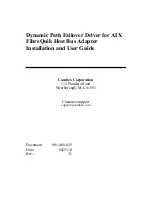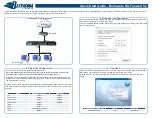
and set up preferences so that the remaining paths to the same
controller are preferred over paths to the alternate controller.
Example 1)
Suppose we have two HBAs, a switch, and two
RAID controllers. A total of four cables, and four paths to each
LUN (2 HBAs x 2 RAID controllers). We use the RAID
controller preference to select which controller each LUN is
accessed on. The target preference lets me balance those
accesses across the two HBAs.
Example 2)
We have two switches, 2 HBAs and 2 RAID
controllers, a fully redundant system. We add an inter-switch
link for in-band management, but we do not want to use this as
a data path if there are any other paths available. We set the ISL
paths' target preference lower than the direct paths, so they will
be used last.
Example 3)
A 2G RAID array is connected to a 2G switch,
which does speed matching to two 1G HBAs in the host. To
avoid saturating either of the 1G paths, We use HBA preference
when balancing the LUNs across the paths.
Multiple Hosts
When we have more than two hosts accessing the same storage,
we find that the limit is usually the number of controller ports.
The HBAs will run below the maximum bandwidth, but the
controllers need to be balanced. Use the controller preferences
and target preferences to balance the loads.
Normally, each host accesses different LUNs through either
controller, so all paths are independent. One special case is
where a RAID controller has LUN groups. All LUNs in a LUN
group are accessed on the same controller. If the different LUNs
7










































